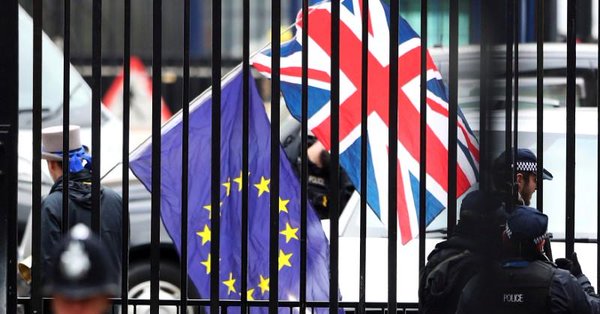What is EU's system of financial market access 'equivalence' on which Brexit deal based?

- Country:
- United Kingdom
Britain and the European Union have agreed on a deal that will give London's financial centre the same basic level of access to the bloc's markets after Brexit that is already offered to countries including the United States, Japan and Singapore.
WHAT IS EQUIVALENCE?
The deal is based around the EU's existing system of financial market access known as equivalence.
The EU grants foreign financial firms market access if it deems their home rules "equivalent", or aligned closely enough with its own rules.
It means foreign firms such as investment firms and clearing houses can serve EU customers largely from their home base and avoid having to set up a subsidiary in the EU.
IS EQUIVALENCE AS GOOD AS WHAT BRITAIN HAS NOW?
No. Currently, inside the EU, all financial firms in Britain have unfettered access to its customers, and the City of London had hoped this would continue after Brexit.
But not all financial services are covered by equivalence. The EU has no such regime for activities including commercial bank lending and desposit taking, and parts of the insurance sector.
Equivalence largely focuses on the wholesale market such as securities trading, leaving out much of the retail sector. That is why many banks and insurers based in Britain have pushed ahead with opening new EU hubs to avoid losing customers.
WHAT HAPPENED TO ENHANCED EQUIVALENCE?
Britain wanted the EU to offer a more accommodative version of equivalence covering a broader range of financial activities, and ensure the EU could not end equivalence-based access at short notice. None of these is included in the Brexit deal.
Britain has said it will continue to push for broadening equivalence and the EU has privately conceded the system needs reform.
SO WHY BOTHER?
For some financial firms, equivalence is better than no access at all as it could mean shifting fewer jobs and activities to EU hubs and perhaps continuing to centralise some back-office operations such as booking trades at global centres in London.
Normally, the EU will not grant equivalence to foreign firms until it has completed lengthy deliberations - about four years in the case of one U.S. derivatives clearing rule.
The deal agreed with the EU would effectively fast-track equivalence determinations during the transition period that ends in December 2020.
Such early notice that it will still have basic access to the EU would help maintain London's position as a global base for banks.
WHAT'S A RULE-TAKER?
There could be some political fallout from a deal.
Backers of Brexit say leaving the EU gives Britain a golden opportunity to ditch EU financial rules such as curbs on banker bonuses in order to keep the City competitive as a global financial hub. They fear that, under equivalence, Britain will end up as a rule-taker - having, like Norway, to mirror EU regulation without having a say on them.
British financial regulators have said they want to stay aligned with EU rules but be granted some flexibility to make changes when it comes to maintaining financial stability.
DOES BRITAIN HAVE ANY LEVERAGE?
Equivalence will cut both ways.
Britain will be asked by EU banks, insurers and investment firms to grant them equivalence. There are several large branches of EU banks operating in London that will want to avoid having to convert themselves into subsidiaries, a costly exercise that involves finding extra capital.
DIDN'T BRITAIN SAY EQUIVALENCE IS A NON-STARTER?
Yes. Government ministers have said the current equivalence system is opaque and unreliable because all decisions are made unilaterally by Brussels and can be scrapped at 30 days' notice.
The City wanted a broader system of market access known as mutual recognition, whereby Britain and the EU accept each other's rules across a broad range of wholesale market financial services, but the EU rejected this.
ISN'T THE EU ALREADY MAKING CHANGES TO EQUIVALENCE?
Yes, but not in the way Britain wants.
Faced with having to continue relying on a foreign financial centre from next March, the bloc - and France in particular - is keen to tighten conditions for granting equivalence in order to keep up the pressure on UK-based firms to shift operations to the EU and help it build up its own capital market.
Foreign clearing houses - London dominates clearing of euro-denominated derivatives - will have to grant EU regulators access to their inner workings if they want to serve the bloc's customers. Foreign investment banks face having to have more operations and capital in the bloc.
On the bright side for Britain, the scope of equivalence was substantially increased in January when the EU updated its "MiFID II" securities and investment rules, letting banks and investment firms from outside the bloc undertake a wider range of investment and trading activities.
(With inputs from agencies.)
ALSO READ
BRIEF-S&P Says Thames Water Class A & B Debt Ratings Lowered On Delayed Shareholder Support Outlook Negative
Sri Lanka, bondholders plan fresh round of debt talks this month, Bloomberg News reports
Power Minister warns of debt trap for using borrowed money to provide free electricity
Signature Global net debt up 6 pc in FY'24 to Rs 1,160 cr on land acquisitions for expansion
Biden plans to cancel student loan debt, 23 million Americans may be impacted










